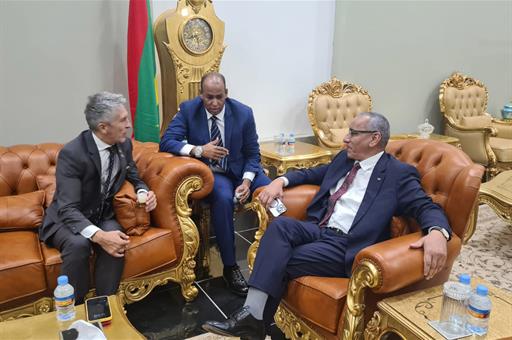Grande-Marlaska reinforces the migratory cooperation in Mauritania that has already prevented 7,000 arrivals to the Canary Islands this year
News - 2023.10.11
The acting Minister for Home Affairs, Fernando Grande-Marlaska, and the Vice-President of the European Commission, Margaritis Schinas, met this Wednesday in Nouakchott (Mauritania) with the country's President, Mohamed Ould Ghazouani, and other members of his government, with whom they discussed the current situation of migration routes in the Atlantic and strengthened cooperation in the fight against human trafficking mafias.
In his meeting with President Ghazouani, the acting Minister for Home Affairs stressed that "the fight against irregular immigration is not only a common bilateral challenge between Spain and Mauritania, but also a shared responsibility with the European Union".
The meeting, which took place during the fourth visit of the Minister for Home Affairs to the country and is the sixth working meeting with the Mauritanian leaders, focused particularly on irregular departures to the Canary Islands and served to discuss ways of improving existing cooperation.
Grande-Marlaska thanked the president of Mauritania for the "excellent joint work" that has been established for a number of years between Spain and the African country on migration issues, and advocated "increasing cooperation at the European level".
In this area, the acting Minister for Home Affairs highlighted the work and example of the National Police and Civil Guard teams deployed in Mauritania, who work side by side with their Mauritanian colleagues in air and land maritime patrols and in the investigation and dismantling of trafficking and smuggling mafias.
Specifically, between the two forces there are around fifty agents who have their own land resources, patrol boats and vessels, as well as helicopters and aeroplanes. Their work has prevented at least 7,000 migrants from reaching the Canary Islands from Mauritania alone, which means less pressure on the islands but also fewer lives put at serious risk at sea in dangerous crossings. Similar teams also operate in The Gambia and Senegal.
Grande-Marlaska expressed to President Ghazouani and Vice-President Schinas the Spanish government's desire to "extend the model of collaboration between Spain and Mauritania, which has produced such good results, to other countries".
Increased EU assistance
Grande-Marlaska also stressed the need to reinforce and extend Spain's support for Mauritania to the European sphere, in order to increase involvement and collaboration in helping a "key and strategic partner" in areas such as irregular immigration, the fight against terrorism and the fight against serious organised crime.
"This tripartite meeting shows that the fight against irregular immigration is not just a common bilateral challenge between Spain and Mauritania, but also a shared responsibility between Mauritania, the EU and all its Member States", the Spanish minister stressed to the African president and the European vice-president.
Grande-Marlaska stressed in this regard that Spain, as holder of the rotating presidency of the Council of the EU, has included among its priorities the strengthening of the external dimension as a key and effective tool within migration policy.
"Mauritania can be sure of Spain's continued support," said the Spanish minister, who described the country as a "priority strategic partner".
Fight against mafias
After the audience with the Mauritanian president, Grande-Marlaska and Schinas visited the offices of the POC Mauritania-EU project to combat illegal human trafficking, in which specialists from the Spanish National Police work with the Mauritanian security forces to dismantle mafias.
The Spanish agents participating in this project are in addition to the National Police and the Guardia Civil deployed in Mauritania, mainly in Nouadhibou and Nouakchott, and dedicated to patrolling and conducting investigations into smuggling and trafficking networks, tasks that they carry out jointly with the Mauritanian authorities.
Following the visit to the POC, the Spanish acting minister and the vice-president of the European Commission will hold a working meeting with the ambassadors of the EU member states accredited in Nouakchott.
Finally, Grande-Marlaska and Schinas will meet this afternoon with the Mauritanian Minister of Defence, Hananna Ould Sidi; the Minister of Home Affairs and Decentralisation, Mohamed Ahmed Ould Mohamed Lemine; the Minister of Economy and Development, Abdessalam Ould Mohamed Saleh; and the Minister of Fisheries and Maritime Affairs, Moctar Alhousseyni Lam, with whom they will look at how to improve the cooperation mechanisms already in place between the EU and the African country.
Grande-Marlaska and Schinas's trip to Mauritania comes barely a week after the Council of the European Union (EU) reached a key agreement to unblock the Pact on Migration and Asylum, on the Crisis Regulation, which was the last file that remained to be closed to complete the Pact and which Spain had included as a priority for its rotating presidency in matters of the Interior.
On Monday 16 October, the Minister for Home Affairs will travel to Senegal to meet with the Senegalese government to discuss cooperation on migration issues.
Non official translation





